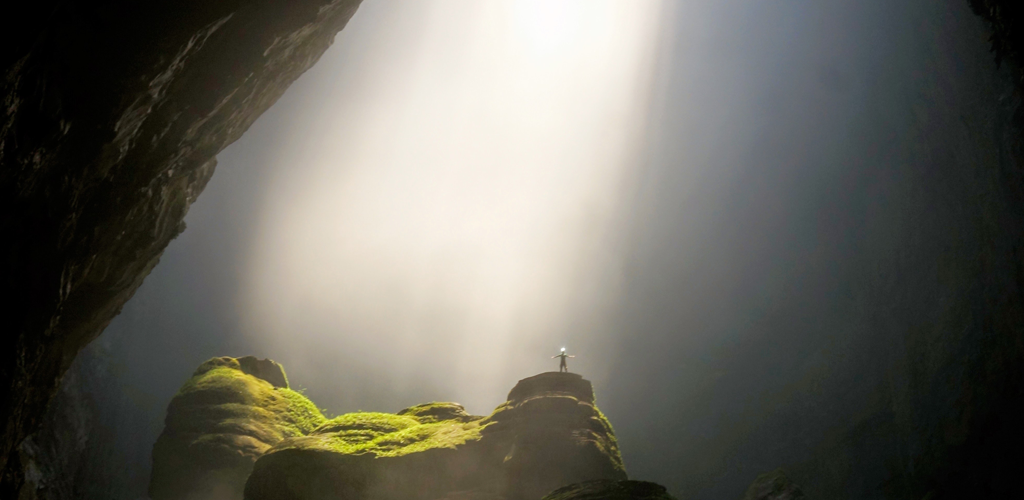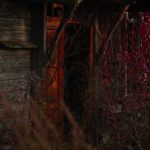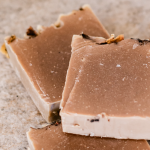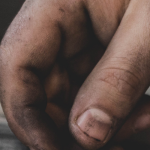When they came to fetch me, they came with nets dragged behind them. I watched them getting slower and slower as they went, their backs bending and their heads down, as heavy and as serious as stones. I stayed as still as I could. I saw them and still I stayed, until they stood breathing before me. The sound of their breath felt damp in my ears.
I must be properly forgotten, and so my narrative must be ended. A tomb erected. A place to gather, to point to as my end.
I couldn’t tell who threw the first net, but I was quickly captured.
“Here she is,” they said on our return, “she has come,” they lied.
*
When they had first sought me out, unwilling to see, the bats had already claimed me.
“I’m human,” I would say to them, “I’m a woman.”
I saw my reflection in the water, and I did not believe it.
The hair was my revelation. At first it was just enough to keep me from freezing, to soften my long nights. Now it is a wonder, as it creeps across my back, my stomach. My neck no longer feels exposed, the much-loved smoothness of my inner arms, my thighs, is now of a different kind, a blaze of reddish fur, a pelt, that does not ask to be kissed. I thought this might be a sign of death. Corpses still seem to grow hair from their heads. Hair itself is a dead thing, but it shows how my life has continued, maybe stronger than before, as I rise and fall and spread and grow without aim. I am now my own cloak. I am all that I possess.
*
“Do you want to keep this?” someone asked. Whatever it was had been a piece of him, it had been touched and looked at and thought about by him.
“You know, it meant a lot to him.”
Each item going through the same pantomime, each given freely and taken without grace. Afterwards – immediately afterwards that is, for now is all afterwards – I tried to describe how my thoughts felt like marbles. Marbles which have been dropped onto an uneven floor, ultimately rolling into the same crevice, with that agonising clink that hits the back teeth.
“We’re all thinking about him,” one of them said. But the words they used were tragedy, devastation, world-shattering, earth-ending, clothe-rending. All this they told me, although their tears had ended. They could shoulder this communal guilt and sadness with ease. They grew fat off it. My grief is a piece of gristle that I chew on eternally, gaining no nourishment, and wearing down my teeth. Every day of his illness I thought that I could not live much longer. Part of me was already unmoored from this world.
There was so much space without him by my side – or really me being by his side – my body no longer knew what to do with itself. I found myself waist deep in the ground, or I woke up with my nose pressed against the ceiling. Once I thought the clouds were the edge of the world, the boundaries of heaven, unreachable. Discovering their impermanence, their dissolution, feels like an affront. That I cannot touch a cloud, that it instead submerges me, covers me in itself, offends my sense of boundaries. When I float towards them, I hope for their embrace, for impact. I want them to contain me, stop me from leaving the atmosphere, claim me as part of this world. Instead the world shakes me off. I cling to the grass, but I still slide downwards. I worry that I might pass straight through the globe, that maybe I will even find myself back home.
I thought that I was still the woman I was before. That I would always be the woman I was before, that I lost my present and my future long ago.
*
Like everyone else, he died both too slowly and too quick. We saw him suffer, and yet we didn’t want him to leave. He held my life together, my soul to my body, my body to the ground. It seems that I had no such claim over him. He refused to take me with him, his last words – “don’t touch me,” he said and others’ hands pulled me back – those words seem to have negated my touch for all time. I am used to being robbed by the living, but not by the dead.
He was once capable of looking into my eyes. His eyes were dark, I could see myself in them, myself as I was: definitely human, a woman – too much of both. And I was the one to look away first. Once my touch was love, my body was all. It was sought and gathered. Broken, it was remade by his hands. If it is now wholly mine, I do not know what to do with it. If it was his legacy I have yet to claim it.
*
The crowd beneath me was a restless sea, torn between surging forward and pulling back, their heads covered and anonymous. Their shouts sounded in rushing changes of pitch rather than in words, my ears had already given up earthly understanding.
They released me and pushed me before them.
Other men, with different nets, of words and laws, had come for me then. The ropes did not hurt, although they tried to make them. My hair could no longer hide me from the ground, they had taken it from me.
He must have already been down there, but I didn’t know then to look for him, to keep on looking for something when everything else had failed. All I understood was their success, that my body was having the proper response to gravity. The ground was incomprehensible as I prepared myself to land at last.
He took my dead body from the ground and raised it to meet him.
…
Biography: Olivia Payne is a librarian working in London. She is an alumni of the Faber Academy and proud member of the Write Like a Grrrl community. She has previously had work published or forthcoming in Litro Magazine, STORGY, The Amphibian Literary Journal, Cobra Milk, and Corporeal. She is currently working on her first novel.
…
Image: unsplash.com





